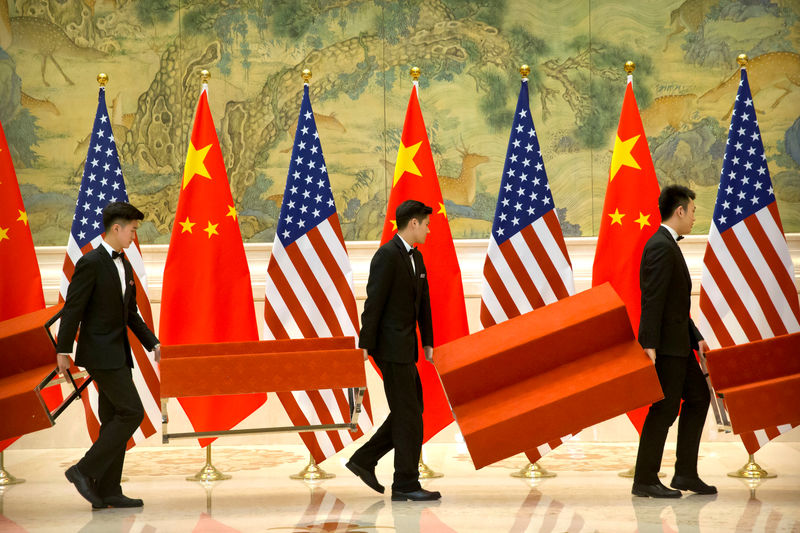By Heather Timmons and David Lawder
WASHINGTON (Reuters) - Trade talks between the United States and China ended last week on a mostly uncertain note, but one thing was clear - the White House canceled a scheduled tariff hike on $250 billion in Chinese goods that would have gone into effect on Tuesday.
Next up, the United States, the world's largest importer, faces a gauntlet of new trade tariff deadlines that it needs to enforce, postpone, or renegotiate. How U.S. officials handle these could further affect a global economy that's already being dented by U.S. trade policy.
Deadlines are piling up. In the nearly three years of Trump's presidency, the U.S. Trade Representative's office has rolled out punitive tariffs and shredded long-standing agreements, recalibrating its trading relationships with every one of its top 10 trading partners, based on goods-alone data from 2018.
This war on every front means the USTR hasn't been able to focus all its resources on the most severe issue - reining in China's unfair trade practices, some trade experts say.
"Significant problems with international trade have been festering for a long time and it's true that the U.S. needed to break something," said Clete Willems, a partner with law firm Akin Gump and former Trump economic advisor.
"However, we didn't need to break it all at the same time and could have been more focused on China from the start," he added.
Here is a rundown:
OCTOBER 18 - EU TARIFFS
As soon as Oct. 18, the United States could start taxing European goods including Provolone cheese and Scotch whisky by 25%, after the World Trade Organization ruled it has the right to tax some $7.5 billion in goods.
Under the measures Airbus planes assembled in Europe will also be hit with a tariff of 10%, putting pressure on the European planemaker to absorb at least part of the cost rather than see deals canceled, industry sources said.
Expect the EU to retaliate, French finance minister Bruno Le Maire said earlier this month. "If the American administration rejects the hand that has been held out by France and the European Union, we are preparing ourselves to react with sanctions," he said..
NOVEMBER 14 - AUTOS 232
A long-running U.S. investigation into whether imported cars and auto parts pose a national security threat comes to a head on Nov. 14.
That's the deadline for the Trump administration to decide whether to impose delayed "Section 232" national security tariffs of as much as 25% on foreign-made vehicles and parts.
The industry says these tariffs would add thousands of dollars to vehicle costs and potentially lead to hundreds of thousands of job losses throughout the U.S. economy.
NOVEMBER 16/17 APEC SUMMIT
Trump and Chinese President Xi Jinping will attend the Asia Pacific Economic Cooperation Summit in Santiago, Chile, and Trump has suggested they could sign a "Phase 1" trade deal there. But the two sides still need to negotiate a text that puts into writing their understandings on intellectual property, currency policy, financial services access in China and agricultural purchases.
This would require intensive negotiations over the next month to try to finalize a text that may include additional actions on the U.S. side to ease tariffs, or more specific purchase commitments by China.
NOVEMBER USMCA VOTE
Negotiations for the U.S.-Mexico-Canada Agreement, which replaces NAFTA, resetting the rules between the United States and its neighbors to the north and south ended in September of 2018. But the U.S. Congress has yet to approve the deal, a requirement for it to go into effect.
Trump, his administration, congressional Republicans and several key business groups have been pressuring House Speaker Nancy Pelosi to take up the measure well before the Thanksgiving holiday on Nov. 28. At the end of November, the bill will compete with a "continuing resolution" budget measure to keep the government funded and running. And after that, the bill could be stuck in legislative limbo as the 2020 U.S. presidential and congressional election campaigns begin to heat up, and an impeachment investigation moves through the House.
However, some Democrats and the head of the AFL-CIO labor union have recently expressed concerns about how labor terms will be enforced. "If there was a vote on the new #NAFTA before Thanksgiving, the agreement would be defeated," the labor union chief said Oct. 9.
DECEMBER 15 NEW CHINA TARIFFS
New tariffs on $156 billion in Chinese goods that have previously escaped the trade war go into effect Dec. 15.

These imports are almost all consumer goods, including cellphones, laptop and table computers, toys and clothing. The deadline was set to allow U.S. firms and retailers to bring in sufficient inventories for the Christmas selling season tariff free, but they could prompt price hikes for last-minute shoppers.